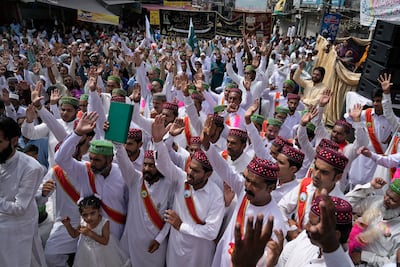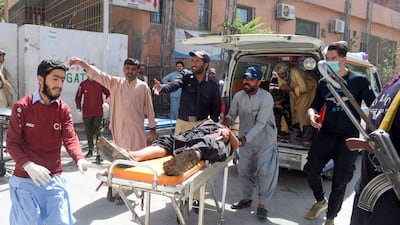More than 59 people died and at least 70 were wounded on Friday in bombing attacks, as crowds marked the birthday of the Prophet Mohammed in Pakistan.
The first blast hit a gathering in the Mastung area of Balochistan province, authorities said.
Shortly after another explosion rocked a mosque in Hangu, Khyber Pakhtunkhwa province, killing at least 10.
Zubair Jamali, the Home Minister of Balochistan, confirmed there were scores of deaths and said "at least 70 individuals have sustained injuries in the explosion".
The region is in the grip of a Pakistani Taliban insurgency, and a rising ISIS threat. The Pakistani branch of the Taliban, Tehreek-e-Taliban Pakistan, denied responsibility for the attacks on Friday.
An area deputy superintendent of police, identified as Muhammad Nawaz Gishkori, was among those killed in Mastung.
Dozens more people were believed to be trapped under the rubble after the blast in Hangu.
A suicide bomber struck the mosque, killing at least 10. More than 50 were buried under the rubble and efforts to find survivors were under way.
The mosque is mainly frequented by police personnel and is inside the main gate of Doaba Police Station.
Saeedur Rehman, a duty officer locally referred to as Moharrar, told The National two armed attackers arrived at the main gate and launched an assault with guns and hand grenades.
One of the attackers was shot dead by policemen, while the other detonated his explosive vest at the mosque's gate.
“The mosque building caved in due to the blast's intensity, and dozens of worshippers were buried under the roof," he added.
A rescue operation was under way, he said.
“The bombing occurred just two minutes before the prayer leader was about to start the Friday prayers,” he added.
Muhammad Azam of Mastung district police said there were fears of more casualties, as several of the wounded were in critical condition.
He said the bomb was powerful and its explosion was heard far from the blast site.
“The bomber detonated himself near the vehicle of the Deputy Superintendent of Police,” Deputy Inspector General of Police Munir Ahmed told Reuters.
The Interior Ministry said a blast was carried out by “terrorist elements”, referring to the Mustang explosion.
“The attack on innocent people who came to participate in the procession of Eid Milad-ul-Nabi is a very heinous act,” it said.
Balochistan's Minister for Information Jan Achakzai posted on X, formerly known as Twitter, that the number of dead was rising.
The Pakistan Taliban, formally known as Tehreek-e-Taliban Pakistan, denied involvement in the attacks.
"The loss of innocent lives in the morning's blast in Mastung is deeply saddening," said Muhammmad Khurasani, a spokesman for the Pakistan Taliban.
"We vehemently condemn the mosque explosion that occurred during Friday prayers in Hangu.
"The objectives of Tehreek-e-Taliban Pakistan are clear: mosques, schools, and public gatherings are not our targets. We have no connection to today's two bombings, and we strongly denounce them.”
The Pakistan Taliban is affiliated with Afghanistan's Taliban movement.

Balochistan has suffered from separatist violence at the hands of Baloch insurgents, but the attacks carried out by the Pakistan Taliban underscore the mounting challenges facing Pakistan's army in the region.
The province has suffered intense violence in recent years between the government and the Pakistan Taliban.
Pakistan was a major base of operations for the Afghan resistance against the Soviet Union, and militant networks have endured for decades in the country despite numerous military operations to oust them, starting in 2007 when the Pakistani Taliban came into existence.












